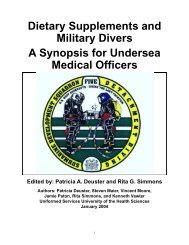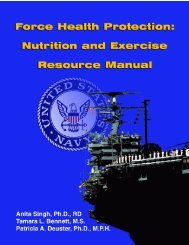Traumatic Brain Injury and Effects of Altitude - Human Performance ...
Traumatic Brain Injury and Effects of Altitude - Human Performance ...
Traumatic Brain Injury and Effects of Altitude - Human Performance ...
You also want an ePaper? Increase the reach of your titles
YUMPU automatically turns print PDFs into web optimized ePapers that Google loves.
<strong>Traumatic</strong> <strong>Brain</strong> <strong>Injury</strong> (TBI) <strong>and</strong> <strong>Effects</strong> <strong>of</strong> <strong>Altitude</strong>:An Analysis <strong>of</strong> the Literature69. Graham, DI, Ford, I, Adams, JH, et al. (1989). Ischaemic brain damage is still common in fatal nonmissilehead injury. J Neurol Neurosurg Psychiatry, 52, 346-350.70. Grissom, CK, Weaver, LK, Clemmer, TP, & Morris, AH (2006). Theoretical advantage <strong>of</strong> oxygentreatment for combat casualties during medical evacuation at high altitude. J Trauma, 61, 461-467.71. Gualtieri, C.T. (1995). The problem <strong>of</strong> mild brain injury. Neuropsychiatry, Neuropsychology, <strong>and</strong>Behavioral Neurology, 8, 127-136.72. Hackett, PH (1999a). High altitude cerebral edema <strong>and</strong> acute mountain sickness: apathophysiology update. Adv Exp Med Biol, 474, 23-45.73. Hackett, PH (1999b). The cerebral etiology <strong>of</strong> high-altitude cerebral edema <strong>and</strong> acute mountainsickness. Wild Environ Med, 10, 97-109.74. Hacket, PH & Roach, RC (2001). Current concepts: high altitude illness – a practical review. N Engl JMed, 345, 107-114.75. Hackett, PH, Rennie, D, & Levine, HD (1976). The incidence, importance, <strong>and</strong> prophylaxis <strong>of</strong> acutemountain sickness. Lancet, 2, 1149-1155.76. Harris, GA, Clel<strong>and</strong>, J, Collie, A, & McCrory, P (2009). Cognitive assessment <strong>of</strong> a trekking expeditionto 5100 m: a comparison <strong>of</strong> computerized <strong>and</strong> written testing methods. Wilderness &Environmental Medicine, 20, 261-2008.77. Hartl, R, Gerber, LM, Iacono, L, et al. (2006). Direct transport within an organized state systemreduces mortality in patients with severe traumatic brain injury. J Trauma, 60, 1250-1256.78. Helling, E & McKinlay, AJ (2005). Considerations for the head-injured air-evacuated patient: a casereport <strong>of</strong> frontal sinus fracture <strong>and</strong> review <strong>of</strong> the literature. Military Medicine, 170, 577-579.79. Hermstad, E & Adams, B (2010). <strong>Traumatic</strong> brain injury complicated by environmentalhyperthermia. J Emerg Trauma Shock, 3, 66-69.80. Hesdorffer, DC & Ghajar, J (2007). Marked improvement in adherence to traumatic brain injuryguidelines in United States trauma centers. J Trauma, 63, 841-848.81. Hoedemaekers, C, Ezzahti, M, Gerritsen, A, & van der Hoeven, J (2007). Comparison <strong>of</strong> coolingmethods to induce <strong>and</strong> maintain normo- <strong>and</strong> hypothermia in intensive care unit patients: aprospective intervention study. Critical Care, 11, R91.82. Hornbein, TF, Townes, BD, Schoene, RB, et al. (1989). The cost to the central nervous system <strong>of</strong>climbing to extremely high altitude. The New Engl<strong>and</strong> Journal <strong>of</strong> Medicine, 3321, 1714-1719.83. Imray, C & Oakley, E (2005). Cold still kills: cold related illnesses in military practice. Freezing <strong>and</strong>non-freezing cold injury. J R Army Med Corps, 152, 218-222.84. Iverson, G.L. (2005). Outcome from mild traumatic brain injury. Curr Opin Psychiatry, 18, 301-317.85. Jaffee, MS, Helmick, KM, Girard, PD, et al. (2009). Acute clinical care <strong>and</strong> care coordination fortraumatic brain injury within Department <strong>of</strong> Defense. J Rehab Res Dev, 46, 655-666.86. Jersey, SL, Baril, RT, McCarty, RD, & Millhouse, CM (2010). Severe neurological decompressionsickness in a U-2 pilot. Aviat Space Environ Med, 81, 64-68.September 14, 2010 32



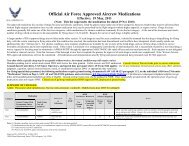
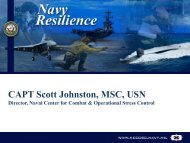
![Body Composition and Military [PDF] - Human Performance ...](https://img.yumpu.com/43269347/1/190x245/body-composition-and-military-pdf-human-performance-.jpg?quality=85)
![Tips for Grocery Shopping [PDF]](https://img.yumpu.com/37447379/1/190x245/tips-for-grocery-shopping-pdf.jpg?quality=85)
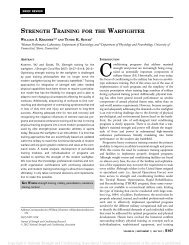
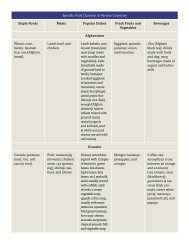
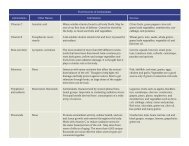
![Synthetic Drugs [PDF] - Human Performance Resource Center](https://img.yumpu.com/37447322/1/190x245/synthetic-drugs-pdf-human-performance-resource-center.jpg?quality=85)
